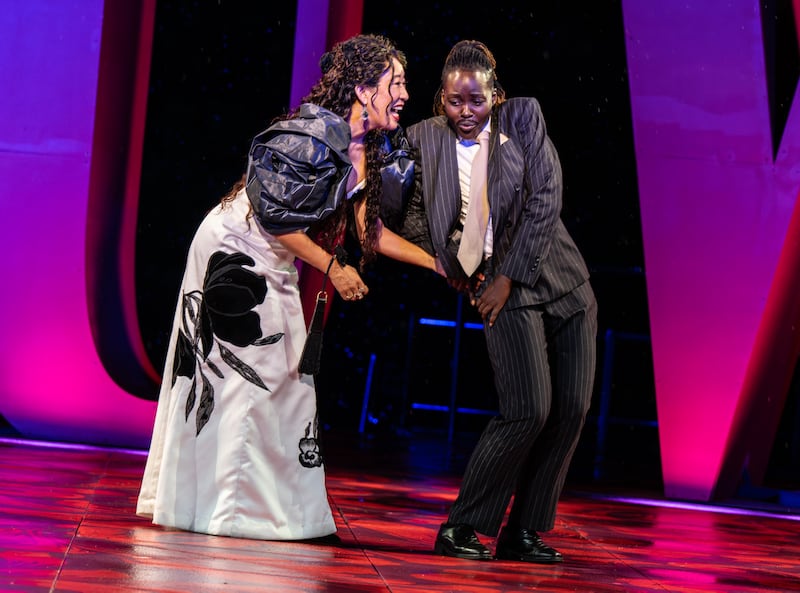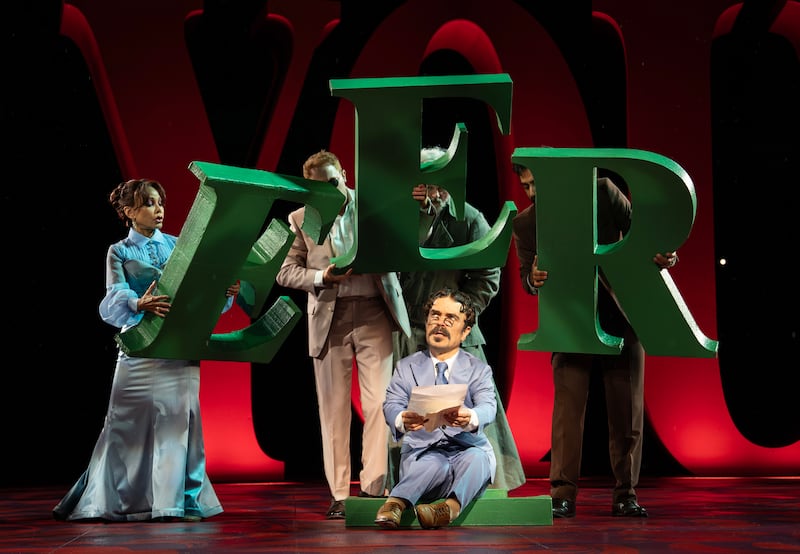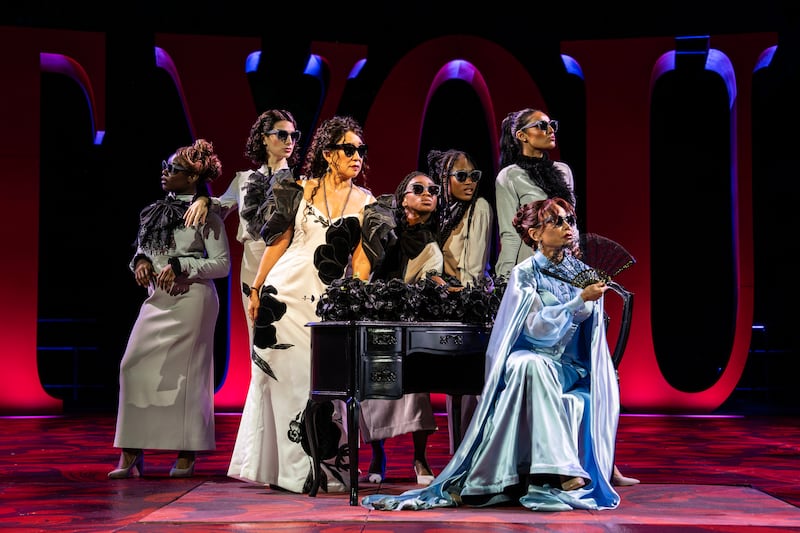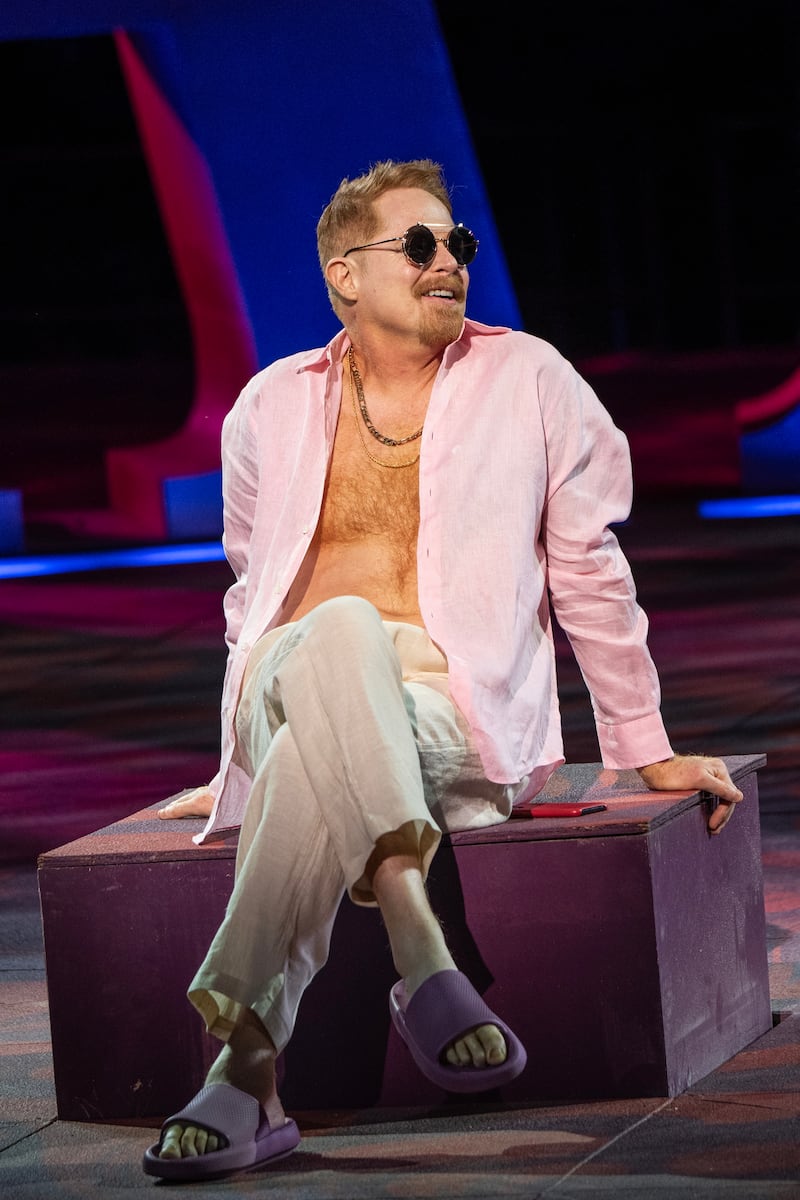Line up once more, New York City! Free Shakespeare in the Park, as overseen by the Public Theater, is back after two years away and an $85 million facelift.
First, as ever, you must negotiate safe passage across a Central Park drive with runners and cyclists who halt for no-one. If you survive this perilous crossing—Space Invaders fans fare best—you alight upon the Delacorte Theater’s new exterior, curved like a languorous eyelid and clad in handsome, reclaimed redwood from 25 decommissioned water tanks sourced from all of New York’s five boroughs.
The Delacorte’s makeover is more obvious from the outside than inside. Ticket secured, once in the amphitheater you will find new seating, but the seats don’t look new. The rest of the money spent to renovate the space, which has been closed since 2023, is invisible to the audience’s eye—spent on updating vital fixtures, fittings, and the backstage areas.
On a temperate evening with no rain, even a not-great production at the Delacorte feels more of an event than a not-great production in a conventional theater. The perimeter of the stage is fringed with trees, their branches frisking in the evening breeze. When night falls, it accentuates Bradley King’s seductively luxe lighting, the actors’ work on stage, and the uniquely intimate experience of sitting with your fellow attendees in this lovely space. The Delacorte is rightly proud to be a place of free, open art for all.

The return production, a ridiculously star-studded mounting of Twelfth Night, Shakespeare’s comedy of scrambled gender identities and romantic misunderstandings, is straight-out fun.
It features Lupita Nyong’o (Viola), her brother Junior Nyong’o (Sebastian, Viola’s twin), Sandra Oh (Olivia), Peter Dinklage (Malvolio), Jesse Tyler Ferguson (Andrew Aguecheek), Daphne Rubin-Vega (Maria), and Khris Davis (Orsino), and a set with no significant decoration bar the words “What You Will” in large capitals across its rear.
Those words are the final three words that comprised the original title of Shakespeare’s play, and here act as an instruction to today’s audience to take what they will from the play and from their experience at being at the Delacorte itself. Will you linger longer on Viola, washed up in Illyria, believing Sebastian to be dead, dreaming up the ruse of dressing as a man and falling for her new boss Orsino who at the outset wants Olivia? Or will you enjoy Olivia’s comedic lust for Viola, believing her to be a man? Will you lean into the production’s play of gender and identity, or its easy-breezy comedy, or both?

Director Saheem Ali maintains a sitcom-fast pace with some very funny set-pieces. Oh revels in Olivia’s vampishness, while Dinklage elicits similar delight with a Malvolio (Olivia’s lovelorn, too-devoted steward) that is rigidly, comically pompous. There is singing and striding side-eye from Twelfth Night’s far-from-foolish jester, Feste (Moses Sumney).
Nyong’o and Ferguson face each other in a boxing ring, both terrified for different reasons to go through with their scrap. Rubin-Vega, and John Ellison Conlee’s Sir Toby Belch enjoy all the chaos of their mischief-making, the two hedonistic men sharing a bath at one point with cocaine puffing up in dust-clouds from its edges.

Tonally, the production dwells so much in its party-on physical comedy that Shakespeare’s sadder notes are rushed: Viola believing Sebastian has drowned, for example, and the sidelining of Sebastian’s buddy, the worthy, abused Antonio. Malvolio being cruelly driven mad—his jail looking more like a neon suntanning booth—is glossed over.
Dinklage is so engaging to watch in his early scenes that Malvolio’s receding presence, eventually leaving the stage in a vengeful huff, seems a very damp squib, given his audience-conquering command of earlier scenes. The resolution of the other stories in a crowded final scene has similarly odd weighting; you still don’t buy that Viola and Orsino are suddenly a dream couple.

The play has some implicit points to make about immigration and identity; both Lupita and Junior Nyong’o speak Swahili, first in monologues and later when reunited to underline their characters are not from Illyria. It’s thanks to the innate chemistry and closeness of the real-life brother and sister, rather than the production’s funny bones jangling around them, that we feel the profound power of Viola and Sebastian’s connection when it is finally re-established.
This Twelfth Night still ends with Feste’s song about the wheel of life’s capricious nature. But this is then subsumed by a full-force, colorful dance party, an elation-drenched display that reveals again what the Public Theater intends these productions to be: open to all, enjoyed by all, and a defiant evening of New York City joy amid so much—day in, day out—that is grimly unjoyful.
The post Peter Dinklage Shines Under the Stars in Free Shakespeare in the Park appeared first on The Daily Beast.




